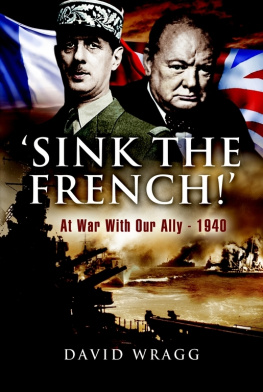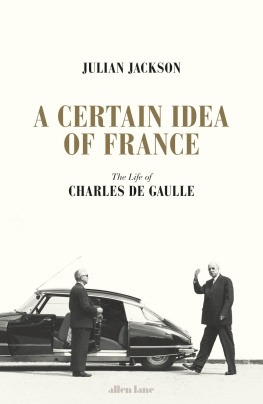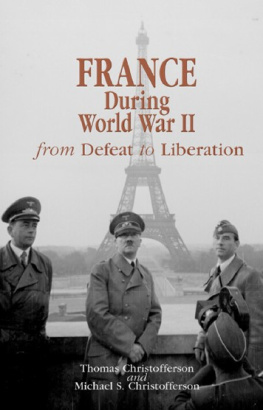

Copyright 2015 Philip Nord
All rights reserved. This book may not be reproduced in whole or in part, in any form (beyond that copying permitted by Sections 107 and 108 of the U.S. Copyright Law and except by reviewers for the public press) without written permission from the publishers.
For information about this and other Yale University Press publications, please contact:
U.S. Office:
Europe Office:
Typeset in Adobe Caslon Pro by IDSUK (DataConnection) Ltd
Printed in Great Britain by TJ International Ltd, Padstow, Cornwall
Nord, Philip G., 1950
France 1940 : defending the republic / Philip Nord.
pages cm
Includes bibliographical references and index.
ISBN 978-0-300-18987-2 (cl : alk. paper)
1. World War, 19391945CampaignsFrance. I. Title.
D755.2.N67 2015
940.54214dc23
2014047023
A catalogue record for this book is available from the British Library.
10 9 8 7 6 5 4 3 2 1
In memory of my father
CONTENTS
ACKNOWLEDGMENTS
I owe a special debt of gratitude to two Princeton colleagues, Paul Miles and Steven Kotkin, who read the manuscript through from beginning to end. Their informed counsel toughened up the argument and saved me from all too many mistakes. I also had occasion to turn for help to Claire Andrieu and David Cannadine, who were generous with their time and expertise. This project got under way while I was a Florence Gould Fellow at the National Humanities Center in North Carolina. My thanks to the NHC for affording me the opportunity to explore a path I would not have otherwise explored. My warm thanks also to my editors at Yale University Press: Heather McCallum, whose encouragement and guidance were essential to bringing the project to fruition; and Richard Mason, who went over the manuscript with an experienced eye, ironing out inconsistencies and helping to unsnarl my prose. As always, I cant see how I would have managed any of this without the steadying hand and loving partnership of my wife, Deborah. She is the best.
INTRODUCTION
STRANGE DEFEAT?
There have been many wars and many defeats, but Frances defeat in 1940 was among the most momentous in Europes history. France, not twenty years before, had emerged a victor in the Great War, its army as a result earning a reputation as one of the strongest in the world. That war had ground on for more than four years. The campaign of 1940 by contrast was over in a comparative twinkling after just six weeks of combat, and the result was a rout. An estimated 90,000 French soldiers died in the fighting and well over a million and a half were taken prisoner. Frances parliament gave up on democratic institutions and turned over the reins of power to a military man, Marshal Philippe Ptain, who proceeded to construct an authoritarian regime that entered into collaboration with Hitlers Germany.
The accumulating misfortunes, though, were not Frances alone. The British, Soviets, and Americans had all predicated their own defense policies on the sure-fire staying power of the French army and now had to scramble to recalibrate their plans. Hitler in the meantime was unleashed on Europe, and it would take almost five years more of bitter warfare to bring him at last to heel.
A defeat of such dimensionsnot just massive but also unexpectedcried out for explanation. Ptain, as might be imagined, had one ready to hand, which he articulated in a speech on 20 June, just four days after he had become prime minister and three after appealing to the Germans for an armistice: Too few babies, too few arms, too few alliesthese were the causes of our defeat, as he put it.
For Ptain and Bloch, the defeat of 1940 was not just a military event but a moral judgment on France as a nation. Such a view had a long life ahead of it. In Search of France, a collection of half a dozen essays, was published in English and French editions in 1963.
These authors see effort where critics have seen abdication and bankruptcy. French diplomats may have been slow to catch on to the Nazi threat, but catch on they did, and they then labored hard to build an anti-German coalition, dragging along allies who were reluctant to abandon entrenched policies of appeasement and neutralism. Ptain and Bloch blamed the French defeat on too few arms. Not so, answer the revisionists, who counter that Frances rearmament drive in the late 1930sexcept in the domain of aircraft production and perhaps even in that domain toowas more success than failure. Nor was the French public so slack and pacifist as is oftentimes supposed. In the wake of the Munich debacle of 1938, opinion stiffened, rallying to the banner of national defense. As for the defeat itself, no doubt French soldiers were ill served by their generals, but they fought well nonetheless, and the military catastrophe that unfolded in MayJune 1940 was due as much to what the Germans did right as to what the French did wrong. Not just that: France went to war with allies. The strange defeat of 1940 was a defeat for them toofor the British, Belgians, and Dutchso why read the event as a reflection on the French alone?
So, who is right? No definitive conclusion, of course, is possible, but I will make the case for a more sympathetic understanding of Frances defeat.
This book is as much an argument as a narrative history, and unlike much of the work on the subject, it will set the French experience in a comparative perspective. There is a strong tendency to view Frances fate in isolation. In many ways, to be sure, the 1930s were a low dishonest decade for the French, but they were that too for most of Europe. France was routed in the spring of 1940, but for Hitlers military the Battle of France was just one victory in an unbroken string (the Battle of Britain apart) that did not come to an end until the German armys advance ground to a halt outside Moscow in early December 1941. Add in the defeats dealt by the Japanese to Great Britain and the United States in the Pacific theater on into 1942from Singapore to the Philippinesand Frances own misfortunes begin to look a good deal less strange. If Frances debacle is proof of moral decay, then the entire non-fascist world must stand in the dock alongside.
Yet in one crucial, even paramount, respect, Frances defeat was exceptional, and the comparative perspective brings that aspect into sharp relief. In the aftermath of the 1940 debacle, the Dutch sovereign, Queen Wilhelmina, the Dutch government by her side, departed for exile in Britain. So too did the Belgian government, though the king, Leopold III, elected to stay behind. In France, just one government member made his way to London, Charles de Gaulle, and he was no more than a junior minister acting on his own initiative. It is not that the French government made no effort to continue the fight from abroad. There was an attempt to relocate the Republics most senior officials to North Africa in June 1940, but that effort was sabotaged. No, the French government did not take the path of exile but transformed itself, step by step, into an authoritarian and collaborationist regime, Vichy.
This was a unique outcome, one that requires a France-specific explanation, and I will advance just such an explanation at the end of the book. Suffice it to say for the moment that Vichys advent was not proof of French decadence but of another, no less consequential malaise whose diagnosis remains as yet to be worked out. Most discussions of 1940 stop with the armistice in June; this one will carry the story a month further to show how and why defeat ended in the Third Republics demise and its replacement by the Vichy government of Philippe Ptain. In this respect, my account will be more encompassing than previous ones. While adding on a month to the story may not sound that consequential, it is, for in those few weeks a democracy, abetted by its enemies, self-destructed, a dispiriting spectacle that raises questions about the vulnerabilities of democratic institutions in France (as elsewhere for that matter).
Next page











